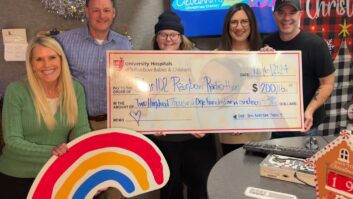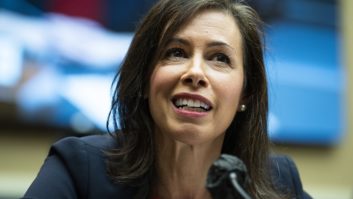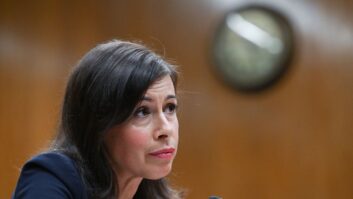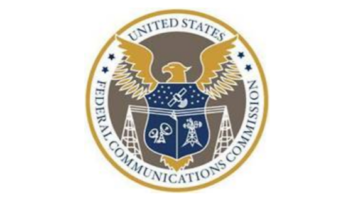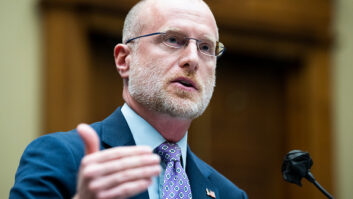With less than a week left before her duties as chairwoman of the Federal Communications Commission come to an end, Jessica Rosenworcel is bidding farewell to her colleagues.
Rosenworcel, a Democrat, will relinquish her role as chairwoman when Donald Trump begins his second term as president on Jan. 20. Rosenworcel served as a commissioner from 2012 through early 2017. She was reconfirmed later in 2017 at the same time that Brendan Carr — the incoming FCC chair — joined the agency. She was then reconfirmed to a five-year term in December of 2021.
At the commission’s meeting on Jan. 15, Rosenworcel shared a heartfelt speech to mark her last meeting as chairwoman.
You can read her speech in its entirety below.
As others have mentioned, this is my last meeting as Chairwoman of the Federal Communications Commission. That means this is the last statement I will deliver with a gavel in hand. So I thought it would be interesting to look back and see what I said during my first meeting after taking the reins of this agency.
It was four years ago, next week. And those remarks were delivered in the most august of all settings — a conference call over Zoom. But there was one passage from my remarks that day stood out:
“We have work to do to put consumers first. We have work to do to support digital equity, especially in communities that have been overlooked and underserved for too long. We need to advance communications policies that keep the public safe and cybersecure. We have work to do to continue our history-making wireless and auction policies that serve as a global model. We have work to do to build bridges and find common ground with our state, local, and Tribal partners. We have work to do to ensure that our functional equivalency policies live up to our responsibilities under the Americans with Disabilities Act. We have work to do to keep media policies current, while also honoring our longstanding values of competition, localism, and diversity. We have work to do to ensure that all students have the internet access they need for a fair shot at 21st century success, no matter who they are or where they live. And we have work to do to ensure open, reliable, and affordable broadband reaches 100% of this country — rural areas, urban areas, and everything in between.”
Based on today’s presentations, I don’t think there is any question that, on every count, we did the work and delivered for the people of the United States.
Working together, we were able to build the largest broadband affordability effort in our nation’s history.
Working together, we launched the first-ever Space Bureau and created a Single Network Future that is going to change communications around the globe.
Working together, we built broadband maps that are light years ahead of anything that came before.
Working together, we put national security and cybersecurity front and center, for the first time in history revoking service authorizations and removing insecure equipment in our networks.
Working together, we closed the Homework Gap like never before, helping millions of students and making sure wireless hotspots are available for loan in every school and library across the country.
Working together, we made communications more just for more people in more places with texting to 988, wireless emergency alerts in more than a dozen languages, and safe connections for survivors of domestic violence.
Working together, we finally made prison payphone rates just and reasonable. And we built a new version of Amber Alerts to help the women and girls who go missing on Tribal Lands.
Working together, we also made communications more secure, with the first-of-its-kind U.S. Cybersecurity Trust Mark coming soon to billions of internet of things devices.

[Related: “Rosenworcel Lists Her Highlights of 2024“]
These actions, and all the others that were mentioned today, fill me with a real sense of pride.
They also fill me with gratitude, because they were only possible thanks to the work of others. So I would like to acknowledge the people who helped make this happen.
First, I want to thank you my colleagues at the commission. We don’t always see things the same way but, together, we have turned down the noise and ramped up the work. I think the most valuable thing to do in this role is get *stuff* done and on that score we have made real progress.
We put a lot of wins on the board that made a meaningful difference in the lives of people in every corner of this country. And, we did it while transitioning our way out of a historic pandemic that disrupted life like nothing before.
Thank you to my personal staff. Hardly a week goes by where I don’t think I couldn’t make it through without my Chief of Staff Narda Jones, my Chief Counsel Priscilla Delgado Argeris, or my Chief Legal Advisor Ramesh Nagarajan. Of course, for years, I said the same thing about Travis Litman, Kate Black and Umair Javed.
Narda, Priscilla and Ramesh replaced the irreplaceable. I am well aware of how fortunate I am to have had so many remarkably talented people stepping up to be a part of our team and advance this agency’s mission.
I especially appreciate the work of my advisors because way back at the turn of the millennium, I served as staff in one of our bureaus. Later, I walked in their shoes when I became an advisor for Commissioner Copps. And, quick aside, a big thank you to him. He is the model of what we want from our public servants, and I will be forever grateful he provided me with the opportunity to serve in his office. I know from that experience being an advisor is work that takes skill, grace, and determination — lots of it.
So, in addition to Narda, Priscilla, Ramesh, Travis, Kate and Umair, thank you to Jonathan Campbell, Elizabeth Cuttner, Rashann Duvall, Trent Harkrader, Holly Saurer, Carmen Scurato, David Strickland, Sanford Williams, D’Wana Terry, Paloma Perez, Brian Phillips and Jonathan Uriarte. And, of course, we will always remember my first wireless advisor Ethan Lucarelli, who served as the first head of our new Office of International Affairs, and tragically died at age 42. We are all better for having had Ethan pass through our lives.
When we talk about my personal staff, my office would not be complete without the assistance of our most valuable players — and that’s Andi Roane, Aurelle Porter, Ovonda Walker, Antonio Moore and Taylor Grant.
I already thanked many of them after their presentations, but thank you to all of our past and present Bureau Chiefs and Office leaders: Marlene Dortch, Loyaan Egal, Michele Ellison, Trent Harkrader, again, Peter Hyun, Debra Jordan, Julie Kearney, Ira Keltz, Jean Kiddoo, Bambi Kraus, Kate Matraves, Brian Moulton, Paloma Perez, again, Alejandro Roark, Suzy Rosen Singleton, Holly Saurer, again, Troy Tanner, Joel Taubenblatt, D’wana Terry, again, and Jeff Tignor. Thank you also to Ron Repasi and Giulia McHenry who recently left the agency but also served in leadership roles. Every one of these people knows how to translate ideas into action and I am grateful for their service.
Special thanks to Mark Stephens and everyone in the Office of the Managing Director, which has to be the agency’s most unsung and indispensable office.
Most important, thank you to the FCC Staff. This is where I am afraid I am going to get myself into trouble. Because if I start naming people I wouldn’t know where to stop. I thought I might be forgiven for singling someone out because someone already did it for us. Each year, a group called the Partnership for Public Service hands out the Service to America Medals, which are called the Oscars of government service. Back in 2021, one of our own, Senior Economist Evan Kwerel, was recognized with their Career Achievement Award.
Evan was recognized because he is the person most responsible for the agency’s greatest policy innovation—spectrum auctions. In a 1985 white paper, he proposed allocating spectrum through auctions; he then worked with two economists from Stanford to design those auctions, and, in 1993, he wrote the rules for conducting those auctions. In 2020, those Stanford economists were awarded the Nobel Prize for their pioneering work on spectrum auctions, and said, “it would have been appropriate for Evan to share the prize.” This is the same extraordinary work, by the way, that led to the FCC receiving an Emmy Award this year, too.
[Related: “Trump Presidency Will Bring Sweeping Change to FCC“]
This story is the most vivid example I could think of to make the following critical point: when it comes to technology policy, the FCC’s best are our nation’s best and are the world’s best. That unparalleled expertise, matched by a commitment to serving others, makes it possible for us to build a digital future that works for everyone. I wish that I could thank every one of you by name, but, to all of the FCC staff in the room or watching online, please now that I admire you and appreciate you.
I know this has been a long meeting. You have heard about a lot of programs and policies, and I just ticked off a lot of names. I will not hold it against anybody if you missed some of the details. To me, today’s meeting tells a story. And it is the story of what makes the FCC special. I think it comes down to three things.
One, at the FCC, we help write the future. If you look at every great challenge before our country — how we grow our economy, how we learn, how we treat the sick, how we heal our planet, how we govern ourselves — communications technology is part of the solution. It touches every facet of our lives and it will only grow more and more important. What is particularly exciting, and daunting, is that technology is constantly evolving. With each new advancement — whether it’s 6G or Wi-Fi 7, connectivity from space or uncrewed drones, quantum computing or AI — we open up new possibilities. At the FCC, we get to play a part building this future. This is as thrilling as it is fulfilling.
The second thing that makes the FCC special is the “power of all.” So many of the actions you heard about today are an outgrowth of the agency’s founding mandate to make communication available to all the people of the United States. That mandate is a reflection of our nation’s founding premise that all of us are created equal and an extension of the enduring promise of opportunity for all that is at the heart of the American Dream.
The third thing that makes the FCC special is its people.
To talk about this, I want to roll back to my first confirmation hearing to serve as a commissioner at the agency. It was in late 2011.
Let me set the stage. After serving in the trenches at the FCC, I went on to serve as staff on Capitol Hill for two individuals who knew how to legislate and get *stuff* done, Senator Inouye and Senator Rockefeller. I spent the bulk of my time working for Senator Rockefeller who became a great friend, mentor, and sponsor. He was the one who I worked with closely to develop the first nationwide network for first responders — making it possible to honor the last remaining recommendation from the 9/11 commission.
But on that day I first testified before Congress, I went from being his staff to being seated at the witness table. It is a real change in perspective. Before this, I had sat dutifully behind legislators as they asked questions. Now I was the one answering them. The one thing I understood without a doubt was the strength of the FCC staff because I had been among them. So I began my testimony talking about public service and the FCC staff.
As I said that day:
“The FCC staff is not just uncommonly talented and knowledgeable about communications law and policy, it’s also an exceptional group of public servants. I think public service is a special calling.”
“I also like to think it runs in my family. I grew up mostly in New England, with pitstops in Southern Illinois and Northern New Jersey along the way. My father served in the Air Force and later went on to a career as a nephrologist in Hartford, Connecticut. For three decades he ran the city’s clinic for hypertension and kidney failure. My mother spent over two decades helping run a soup kitchen. And my grandfather before them served in the United States Customs Service right here in Washington. My great grandfather before that served the public in a different way — he swept the streets of New York.”
Those words resonate now even more than they did back then.
One reason is that over my years in leadership, the people of this agency have affirmed my faith. Day in and day out, they impress me with their thoughtful take about every aspect of communications technology. They also remind me that the words I said were true. Public service is a special calling.
Public service also demands a lot from us. That has certainly been my experience leading this agency. I am the first woman confirmed to do so. And I was able to break a glass ceiling because my family helped picked up the pieces at home. So thank you to my husband Mark, my children Caroline and Emmett and even our rescue dog Bo. They are my everything. And they will be seeing a whole lot more of me from here on out.
Thank you to President Biden for giving me the opportunity to make history. It has been the privilege of a lifetime.


